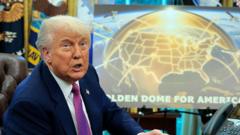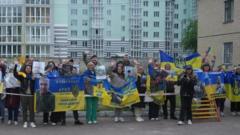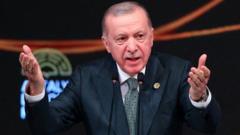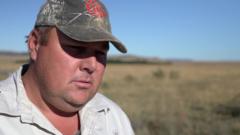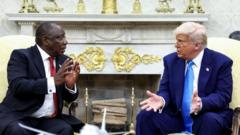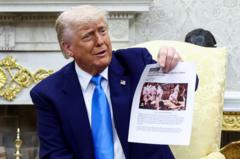South African President Cyril Ramaphosa's recent clash with Donald Trump garnered mixed reactions at home, but it may reinforce his political standing. While concerns over domestic issues persist, his diplomatic approach reminded many of his negotiating prowess, potentially strengthening his support within the country.
Ramaphosa's Diplomacy Under Fire: Unexpected Gains from Trump's Confrontation

Ramaphosa's Diplomacy Under Fire: Unexpected Gains from Trump's Confrontation
In a tense Oval Office meeting, South African President Cyril Ramaphosa faced off against Donald Trump's unfounded claims, prompting both critique and admiration back home.
In a dramatic display of high-stakes diplomacy, South Africa's President Cyril Ramaphosa faced off against former President Donald Trump this week in Washington. What was intended to be a meeting aiming for economic diplomacy devolved into a spectacle where Trump reiterated discredited claims of a "white genocide" in South Africa. The moment was broadcast worldwide, leaving Ramaphosa under intense scrutiny for his response.
Despite the vitriol directed at him during the confrontation, opinions at home varied. Many praised Ramaphosa for maintaining his composure and for his reconciliatory stance amid Trump's barbs. However, critics expressed disappointment that he did not more forcefully challenge the unfounded accusations. Ramaphosa returned to a South Africa facing myriad issues, including an unstable economy, high crime rates, and ongoing corruption scandals, as well as internal divisions within his own party, the African National Congress (ANC).
The backdrop to this confrontation involves South Africa's challenging coalition government, formed after disappointing election results that forced the ANC into a partnership with ten other parties. Public dissatisfaction with the government's handling of pressing issues has intensified, pressuring Ramaphosa to assert more decisive leadership. Despite these challenges, Ramaphosa's adept handling of the diplomatic encounter may serve to bolster his image domestically, reminding the populace of his historic role as a uniter and negotiator during South Africa's transition from apartheid.
In contrast to critiques of his leadership style, many believe that the high-pressure situations in which Ramaphosa excels could translate into increased support for him. Analysts are suggesting that the Oval Office encounter, which could have been a humiliation, may instead present a political advantage—reminding South Africans of his significance in fostering stability amidst chaos.
Local political dynamics are shifting as well, with figures like Julius Malema—whose extremist rhetoric recently caught Trump's attention—attempting to capitalize on the drama. However, this surge in visibility for Malema and his Economic Freedom Fighters (EFF) may not translate into lasting political success, as public sentiment leans toward stability over radicalism.
Moreover, as entities like Afriforum—the Afrikaner interest group—continue to push their narrative of persecution, many South Africans are reportedly growing weary of such divisive tactics. Instead, there appears to be a movement toward recognizing solidarity and cooperation within the country, a trajectory that Ramaphosa's alignment with other coalition partners may embody.
As Ramaphosa navigates both the fallout from the strained US relations and the internal challenges back home, this moment of diplomatic confrontation may inadvertently solidify his standing. It underscores the question of leadership in South Africa and emphasizes the need for stability as the country confronts its deep-rooted issues amidst politically charged climates, both domestically and abroad.

